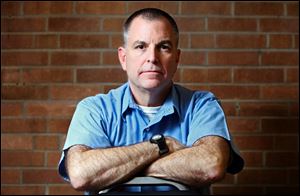
State opposes Noe release
Attorney general’s office asks U.S. court to deny petition
9/20/2011
Tom Noe was found guilty in 2006 of 29 charges of corruption, theft, money laundering, and tampering with records.
The Ohio Attorney General’s Office asked a federal judge on Monday to deny Tom Noe’s request to be released from prison, saying that the former Toledo-area coin dealer did not demonstrate he was deprived of a fair trial.
In a 28-page response filed in U.S. District Court in Toledo Monday, the state opposed Noe’s petition for a writ of habeas corpus.
Specifically, the state said Noe did not show his three grounds for relief — which were similar to those raised during his appeals in state court — met the required standards.
The state then asked the court to decide the issue without a hearing and dismiss the petition.
A Lucas County Common Pleas Court jury found Noe guilty in 2006 of 29 charges of corruption, theft, money laundering, and of tampering with records for the theft of millions of dollars from two $25 million rare-coin funds he managed for the Ohio Bureau of Workers’ Compensation.
He was found not guilty on 11 other charges, and several others were dismissed or consolidated. Thomas Osowik, a Common Pleas judge at the time, sentenced Noe to 18 years in state prison and ordered him to pay $13,747,000 in restitution, the cost of prosecution totaling $2,979,402, and $139,000 in fines.
His conviction was upheld by the 6th District Court of Appeals in December, 2009, and on June 9, 2010, the Supreme Court of Ohio refused to grant his appeal a hearing.
Noe began serving his sentence in Hocking Correctional Facility in December, 2008, after he finished two years in federal prison for making illegal contributions to President George W. Bush’s 2004 re-election campaign.
Toledo lawyer Rick Kerger filed the petition on Noe’s behalf in June, nearly one year after the Ohio Supreme Court declined to hear his appeal. The petition claimed three issues, including allegations against the trial court of improper denial of the motion to change venue, improper allowance of the state’s experts, and improper denial of the defendant’s experts.
“I see nothing in there that surprises me,” Mr. Kerger said of Monday’s filing. “Obviously the state is going to try to hang on to its conviction.” Mr. Kerger said he intends to file a reply to the state’s response.
In its response, the state reviewed each of the claims and asserted that Noe failed to show that there were federal constitutional issues inconsistent with the state courts’ opinions — a necessary element to prove that a writ for habeas corpus should be granted.
Using transcripts from the court of appeals’ opinion, the attorney general’s office stated that the “appellate court’s judgment was not contrary to or an unreasonable application of clearly established Supreme Court precedent.”
In particular, the response stated there was no evidence that pretrial publicity resulted in either presumed or actual prejudice against Noe.
“As noted in the appellate court’s opinion, there is no evidence that Noe’s trial was ‘utterly corrupted’ by press coverage,” the response stated. “Instead, Noe’s argument that the pretrial publicity denied him a fair trial rests almost entirely upon the amount of media coverage. … In this case, all the 12 jurors who heard this case professed an ability to set aside any pre-existing opinion and remain impartial.”
The state further asserted Noe did not demonstrate the testimony of a state witness or the exclusion of a defense witness at his 2006 trial deprived him of a fundamentally fair trial.
Attached to the response were 52 exhibits totaling 1,094 pages, including a trial transcript.
The case was randomly assigned to Judge John Adams in Akron.
Contact Erica Blake at: eblake@theblade.com or 419-213-2134.